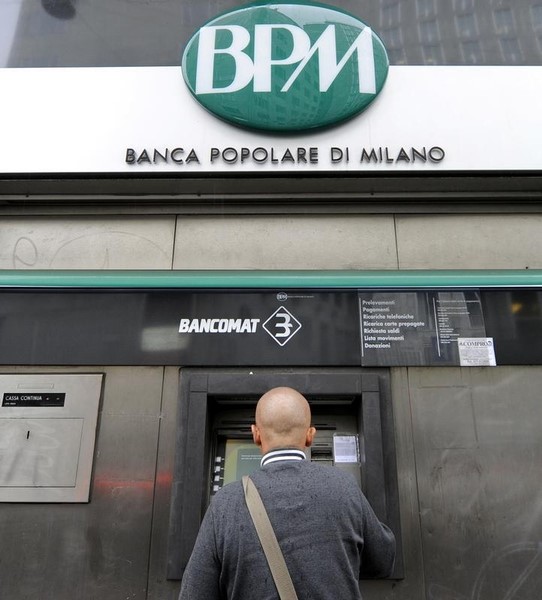By Valentina Za and Andrea Mandala
MILAN (Reuters) - At least five investment banks are vying to win a mandate from Banca Popolare di Milano (BPM) (MI:PMII) and find it a partner as Italian cooperative lenders gear up for a wave of mergers following a landmark reform of the sector.
The Milanese bank, Italy's seventh-largest by branches, has been dubbed by industry watchers the "belle of the ball" among large cooperative lenders that are looking at tie-up options as they are being forced to drop their cooperative status.
A new law forces Italy's 10 largest "popolari" banks to convert into joint-stock companies within 18 months and shed rules that currently grant shareholders one vote each regardless of the size of their stake.
Those rules, together with ownership restrictions, have long been seen as an obstacle to mergers and to attracting new investors, so banks are now bracing for a consolidation frenzy.
Popolare di Vicenza and Veneto Banca have already hired advisers. BPM will send out letters in coming days to invite formal proposals from investment banks, a banking source said.
JP Morgan (N:JPM), Mediobanca (MI:MDBI) and Barclays (L:BARC) are among those hoping to win a mandate, other banking sources said.
Merger speculation has helped BPM shares rise 70 percent so far this year, outperforming a 27 percent rise in Italy's banking sector (FTIT8300). Still, with a market value of 4 billion euros, the bank trades at 0.9 times its tangible book value, below a European sector average of nearly 1.2 times.
Popolare di Milano is based in Italy's financial capital, where per capita income is 50 percent above the national average, and nearly 80 percent of its roughly 700 branches are in the rich northwest - where the percentage of new loans turning sour is 3.2 compared with 5.3 in the poorer south.
"Its location is an undisputable advantage: think of corporate lending and private banking -- a type of business that does not absorb bank capital," said Stefano Caselli, banking and finance professor at Milan's Bocconi University.
He said the government reform and a merger would cure issues that plagued the bank in the past. Before becoming the darling of M&A advisers, BPM long epitomised how voting and ownership limits could distort governance at Italy's popolari.
An association of employee-shareholders used to held sway over BPM and the Bank of Italy forced it to adopt penalising capital measures after an audit in 2011 unveiled organisational and governance problems.
The lender was allowed to drop the additional requirements after a 500-million euro cash call last year and its best-quality capital stood at 11.6 percent at end-2014 - above a minimum requirement of 9 percent set by the ECB and better than that of much larger domestic rival UniCredit (MI:CRDI).
A top Italian banker who requested anonymity said capital ratios and geography made BPM the most attractive popolare bank: "I'd buy it if I could, but it takes two to tango," he said.
BPM says it is open to all partners with a solid business plan. Banco Popolare (MI:BAPO) and Banca Popolare dell'Emilia Romagna (MI:EMII), respectively Italy's fourth- and sixth-largest banks, are tipped as the most likely candidates.
BPM can boast the best asset quality in Italy, according to Societe Generale: it had 3.6 billion euros in net problematic loans at the end of last year, or 81 percent of tangible equity against a national average of 122 percent.
The bank has higher labour costs than peers, but this provides room for cuts that would boost profits, experts say. BPM spent 77,570 euros per employee last year versus, say, 67,000 euros at Popolare Emilia.

BPM's size also means doing a due diligence and integrating it would be easier. "It's bite size, it can be swallowed," said Paul Moran, broker Aviate Global's head of research. That may not suit the ambitions of CEO Giuseppe Castagna, who has indicated the bank wants to be treated as an equal, not a prey.